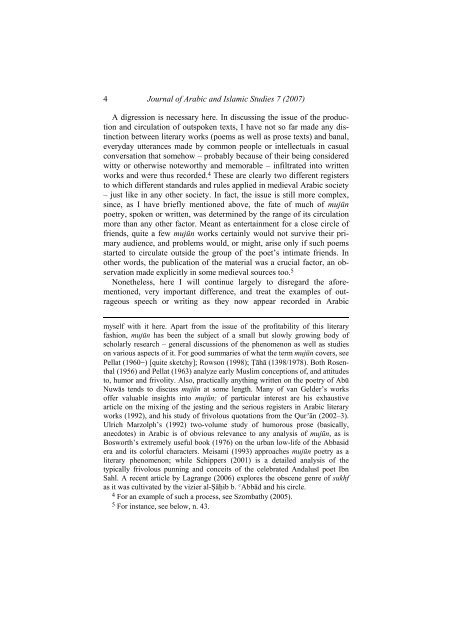Freedom of Expression and Censorship in Medieval Arabic Literature
Freedom of Expression and Censorship in Medieval Arabic Literature
Freedom of Expression and Censorship in Medieval Arabic Literature
You also want an ePaper? Increase the reach of your titles
YUMPU automatically turns print PDFs into web optimized ePapers that Google loves.
4<br />
Journal <strong>of</strong> <strong>Arabic</strong> <strong>and</strong> Islamic Studies 7 (2007)<br />
A digression is necessary here. In discuss<strong>in</strong>g the issue <strong>of</strong> the production<br />
<strong>and</strong> circulation <strong>of</strong> outspoken texts, I have not so far made any dist<strong>in</strong>ction<br />
between literary works (poems as well as prose texts) <strong>and</strong> banal,<br />
everyday utterances made by common people or <strong>in</strong>tellectuals <strong>in</strong> casual<br />
conversation that somehow – probably because <strong>of</strong> their be<strong>in</strong>g considered<br />
witty or otherwise noteworthy <strong>and</strong> memorable – <strong>in</strong>filtrated <strong>in</strong>to written<br />
works <strong>and</strong> were thus recorded. 4 These are clearly two different registers<br />
to which different st<strong>and</strong>ards <strong>and</strong> rules applied <strong>in</strong> medieval <strong>Arabic</strong> society<br />
– just like <strong>in</strong> any other society. In fact, the issue is still more complex,<br />
s<strong>in</strong>ce, as I have briefly mentioned above, the fate <strong>of</strong> much <strong>of</strong> mujūn<br />
poetry, spoken or written, was determ<strong>in</strong>ed by the range <strong>of</strong> its circulation<br />
more than any other factor. Meant as enterta<strong>in</strong>ment for a close circle <strong>of</strong><br />
friends, quite a few mujūn works certa<strong>in</strong>ly would not survive their primary<br />
audience, <strong>and</strong> problems would, or might, arise only if such poems<br />
started to circulate outside the group <strong>of</strong> the poet’s <strong>in</strong>timate friends. In<br />
other words, the publication <strong>of</strong> the material was a crucial factor, an observation<br />
made explicitly <strong>in</strong> some medieval sources too. 5<br />
Nonetheless, here I will cont<strong>in</strong>ue largely to disregard the aforementioned,<br />
very important difference, <strong>and</strong> treat the examples <strong>of</strong> outrageous<br />
speech or writ<strong>in</strong>g as they now appear recorded <strong>in</strong> <strong>Arabic</strong><br />
myself with it here. Apart from the issue <strong>of</strong> the pr<strong>of</strong>itability <strong>of</strong> this literary<br />
fashion, mujūn has been the subject <strong>of</strong> a small but slowly grow<strong>in</strong>g body <strong>of</strong><br />
scholarly research – general discussions <strong>of</strong> the phenomenon as well as studies<br />
on various aspects <strong>of</strong> it. For good summaries <strong>of</strong> what the term mujūn covers, see<br />
Pellat (1960−) [quite sketchy]; Rowson (1998); Ṭāhā (1398/1978). Both Rosenthal<br />
(1956) <strong>and</strong> Pellat (1963) analyze early Muslim conceptions <strong>of</strong>, <strong>and</strong> attitudes<br />
to, humor <strong>and</strong> frivolity. Also, practically anyth<strong>in</strong>g written on the poetry <strong>of</strong> Abū<br />
Nuwās tends to discuss mujūn at some length. Many <strong>of</strong> van Gelderʼs works<br />
<strong>of</strong>fer valuable <strong>in</strong>sights <strong>in</strong>to mujūn; <strong>of</strong> particular <strong>in</strong>terest are his exhaustive<br />
article on the mix<strong>in</strong>g <strong>of</strong> the jest<strong>in</strong>g <strong>and</strong> the serious registers <strong>in</strong> <strong>Arabic</strong> literary<br />
works (1992), <strong>and</strong> his study <strong>of</strong> frivolous quotations from the Qurʾān (2002–3).<br />
Ulrich Marzolphʼs (1992) two-volume study <strong>of</strong> humorous prose (basically,<br />
anecdotes) <strong>in</strong> <strong>Arabic</strong> is <strong>of</strong> obvious relevance to any analysis <strong>of</strong> mujūn, as is<br />
Bosworthʼs extremely useful book (1976) on the urban low-life <strong>of</strong> the Abbasid<br />
era <strong>and</strong> its colorful characters. Meisami (1993) approaches mujūn poetry as a<br />
literary phenomenon; while Schippers (2001) is a detailed analysis <strong>of</strong> the<br />
typically frivolous punn<strong>in</strong>g <strong>and</strong> conceits <strong>of</strong> the celebrated Andalusī poet Ibn<br />
Sahl. A recent article by Lagrange (2006) explores the obscene genre <strong>of</strong> sukhf<br />
as it was cultivated by the vizier al-Ṣāḥib b. ʿAbbād <strong>and</strong> his circle.<br />
4 For an example <strong>of</strong> such a process, see Szombathy (2005).<br />
5 For <strong>in</strong>stance, see below, n. 43.

















